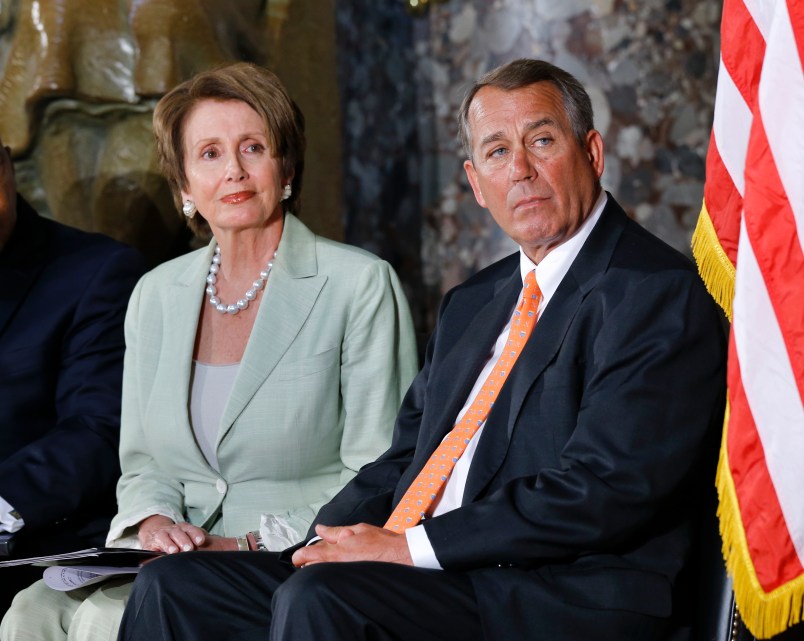WASHINGTON — It was the rarest of Kumbaya moments in the normally rancorous and dysfunctional House of Representatives.
Everyone from Speaker John Boehner (R-OH) to Minority Leader Nancy Pelosi (D-CA) to their deputies and committee leaders and underlings sang the praises of a massive Medicare overhaul bill, giving the equivalent of Oscar acceptance speeches by effusively thanking their staff and colleagues for making it happen.
Then they passed it by an overwhelming bipartisan vote of 392-37, to a smattering of applause in the chamber.
“Don’t look now,” said Rep. Renee Ellmers (R-NC), “but we are actually governing.”
She was right. The bill on its way to the Senate represents the most sweeping health care reform in the five years since Obamacare became law.
It ends the “doc fix” dilemma that has haunted Congress for more than a decade, by replacing the Medicare “sustainable growth rate” formula for paying physicians — which currently imposes deep cuts of as much as 20 percent annually — with incremental 0.5 percent pay raises for doctors in the coming years before transitioning to a new system.
“If someone came down to this chamber from Mars today, they’d be shocked at the camaraderie,” said Rep. Bill Pascrell (D-NJ).
“It represents bold, necessary progress for our country,” said Pelosi.
The “doc fix” has become one of Congress’s most despised rituals, featuring 17 short-term patches since 2003 to stave off the cuts. Virtually every lawmaker wants to end the problem, which is one reason the bill gained broad support even though it’s set to add $141 billion to the deficit in the coming decade.
Rep. Michael Burgess (R-TX), the sponsor and floor manager of the bill called the Medicare Access and CHIP Reauthorization Act of 2015, hailed the “thunderous approval that has come from the peoples’ House. It is time to end the SGR. Let us never speak of this issue again.”
“This is indeed a rare event,” said Rep. Sander Levin (D-MI), the ranking member of the Ways & Means Committee.
Now the tough part: significant long-term cuts to Medicare spending.
The legislation requires seniors who make more than $133,500 to pay more for Medicare coverage starting in 2018, and reduces spending on “first dollar” coverage of supplemental Medigap plans enjoyed by some from 2020 onward.
It also extends the Children’s Health Care Program for two years.
Sen. John Barrasso (R-WY), a Republican leader, said Wednesday he hopes to pass the bill through the Senate before adjourning for a two-week recess. But the timeline is unclear, as the Senate may not complete the budget “vote-a rama” until late Friday night, and would need unanimous consent to skip the usual hurdles and hold a quick vote. Senate Democratic leaders said they weren’t sold on the bill, but several members including Sen. Claire McCaskill (D-MO) and Sen. Joe Manchin (D-WV) said they were inclined to support it.
President Barack Obama has endorsed the bill.
“Today is a good day,” said House Majority Leader Kevin McCarthy (R-CA). “But today should not be the last day.”







I don’t claim to know everything that’s going on in this bill, but somehow, I’m getting this odd, admittedly irrational, feeling that I need to check my pants pocket to make sure that my wallet is still there.
“The legislation requires seniors who make more than $133,500 to pay more for Medicare coverage starting in 2018, and reduces spending on “first dollar” coverage of supplemental Medigap plans enjoyed by some from 2020 onward.”
I’d like to know how much more seniors making more than $133K would pay. As others have noted, the success of programs such as Medicare is partly due to the universal benefit they provide. Charging more to the well-off could make it more vulnerable politically if affluent seniors feel they are being forced to pay for “those people.”
Overall, however, it seems good. Looking forward to seeing more details.
Orange boy is incapable of not looking shifty under any circumstances whatsoever.
“Don’t look now,” said Rep. Renee Ellmers (R-NC), “but we are actually governing.”
Wow. That tells us everything we need to know about the R party.
Apparently the model now is that the incredibly rich are off limits for any tax increase, so we’ll just soak the upper middle class. This will erode support for Social Security and Medicare as the people who paid the most into these programs as taxes throughout their working life find themselves getting asked to pay again in higher co-pays and premiums in retirement, and for exactly the same medicare coverage everybody else gets. How long before they start asking for ways to “opt out”?